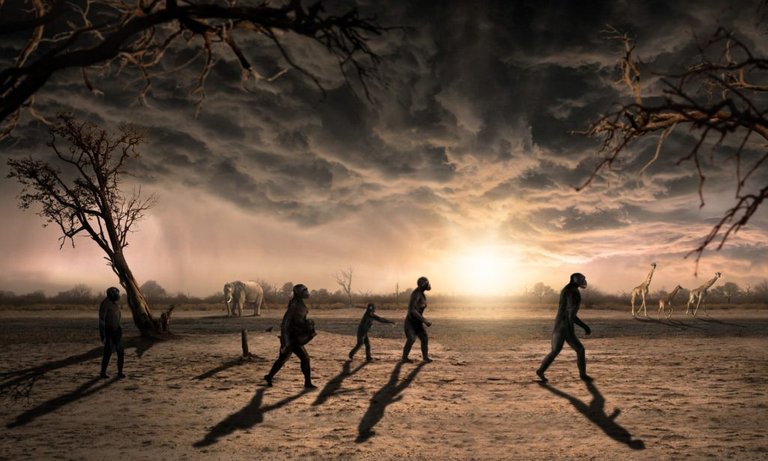
Archaeologists tell us that when Homo sapiens appeared approximately 200,000 years ago, they coexisted with many other human species. And that as recently as 30,000 years ago, besides Homo sapiens, there were at least three more hominin species. Neanderthals in Europe, “Hobbits” from the island of Flores in Indonesia, and the Denisovans in Asia.
However, of all the hominin species that have ever existed, Homo sapiens is the only species that continues to survive. But the reason we have survived, while all the others did not, has eluded us. Suppositions on this subject are rife with speculation but deficient in facts. So, I will admit up front, that like all the others, anything that I might suggest as a reason for our survival, would only be speculation.
Fortunately, my subject is not to explain why Homo sapiens survived, and other hominin species did not. It is to introduce the concept of Disunion; one of the core concepts held by the Philosophy of the Divine Law. A daunting subject in itself!
The Power of Imagination
The reason I opened with a short discussion about the longevity of Homo sapiens, hereafter called modern humans, humankind, human beings, we, or our—is because it is now our survival, that is currently at risk!
My hypothesis as to why modern humans have survived—a statement that practically screams the word speculation—is that at some point, probably through genetic mutation, Homo sapiens developed the ability to imagine. What does that mean? Think about it a moment. Nothing?
What probably does not occur to you, is that the ability to visualize a different way to approach a situation, or issue, is the most potent weapon human beings possess. No matter how formidable, a person without the ability to imagine, cannot defeat a person, who can. To win a battle, one must be able to envision myriad ways to attack their enemy, and the countless ways to protect one’s self from enemy attack. Without the power of imagination, it would be impossible to construct scenarios and consider all the available possibilities.
Therefore, if modern humans developed the ability to imagine, and the other hominin species did not, besides extinction, and the inability to adapt, it is likely that in competition for available resources, modern humans killed off other human species as they encountered them.
Predator and Prey
Unlike its ancient ancestor, who may have had wide-ranging advantages over other human species, modern humans face a foe that is equally able to stand its ground. One whose cognitive and conceptualization abilities are equivalent to its own. Itself!
As both predator and prey, humanity has become its own worst enemy. From individual citizens to developing countries to the world’s superpowers, our current behavior predicts the eventual failure of our social structures, and our subsequent, physical annihilation, by wars, terrorism, and other destructive forces.
Disunion
No matter how we identify ourselves. Whether by race, ethnicity, gender, nationality, language, religion, or the food we eat; our attachment to our society is undeniable, and a powerful social bond that gives us a sense that we belong!
However, in opposition to our sense of societal belonging; our social processing—which we receive through the group into which we are born—provides us with a sense of division. The Philosophy of the Divine Law calls this division, Disunion; and defines it as the natural segmentation of humankind, through social exclusion.
Which, means that we find safety and comfort when we are among those of the same race, ethnicity, or culture. And that we naturally separate ourselves into the group to which we believe we belong.
The philosophy cautions, however, that although social segmentation—which, from this point, I will call disunion—means natural social separation, it does not mean natural social hostility; or that different groups cannot integrate or intermarry.
The Divine Law teaches the universal value we all share is the fact that we are human. That no matter our race, ethnicity, religion, belief, personality or station, as human beings, we are equal.
The Exploitation of Disunion
Although differences in race, ethnicity, and culture do not naturally make individual groups hostile towards each other; religion, politics, and other influences, such as money, power, and preferential treatment; have exploited their natural separation, and created unnatural divisions that provoke hostility, and threaten social stability.
Which, of course, is nothing new. The efforts of one group to dominate another punctuates human history. Whether religious, political, racial, cultural, or environmental, there is no facet of life over which humanity has not fought a war or engaged in conflict.
One has only to read a newspaper, to realize that there is no country, society, or governmental system, where people live and function in total harmony. Upon reflection, it is understandable why many conclude that there are no real or viable solutions, that can prevent humanity’s continuing social decline.
Although the Philosophy of the Divine Law, which, is the origin of the concept of Disunion, agrees that is not possible for humanity to free itself from all conflict. It asserts that the conclusion that there are no real or viable solutions to the problems created by unnatural division is short-sighted—and disagrees with the discourse—that the social decline of humankind, is not preventable.
The philosophy teaches that humanity can prevent its social destruction. Not by issuing new laws—or revised social policy—but with a fundamental change in individual behavior, predicated on the acceptance and practice of the Divine Law.
Image Credit: David A. Lurino